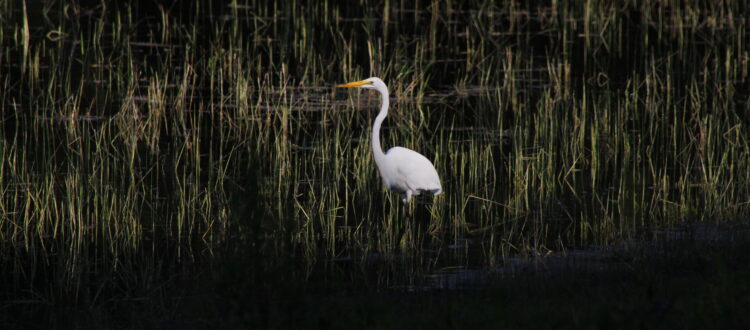
Photo of Great Egret hunting along the shoreline of Big Fish Lake in Putman County (by Zachary Siders)
Sponsor
Southeast Climate Adaptation Science Center; United States Geological Survey
Award Dates
2025-2027
Participants
Project Lead
Cohen, Matt (University of Florida)
Project Participants and Partners
Allen, Mike (University of Florida)
Tirusew, Asefa (Tampa Bay Water, FloridaWCA)
Carton de Grammont, Paloma (University of Florida)
Stamm, John (USGS Caribbean-Florida Water Science Center)
Velez, Darlene (University of Florida, FloridaWCA)
Goals and Objective
Florida faces growing challenges related to changing rainfall patterns, altered water availability, and declining ecosystem health—challenges that are intensified by rapid population growth and land use change. Despite the interconnectedness of water supply and aquatic ecosystems, decisions around their management are often made in isolation. This project aims to bridge that divide by bringing together water resource managers, natural resource managers, and scientists to co-produce science-based strategies that are informed by climate forecasts and grounded in the practical realities of managing systems for both people and nature.
Building on the trusted platform of the Florida Water and Climate Alliance (FloridaWCA), a long-standing stakeholder–scientist partnership, the project will foster collaboration across sectors to identify critical knowledge gaps and support sustained, solutions-oriented dialogue. Through a process of structured engagement, including a dedicated steering committee and a series of in-person workshops, participants will work together to develop a shared understanding of climate-related risks, define collective priorities, and generate a coordinated research roadmap. These efforts will be supported by targeted webinars and proven co-production techniques such as scenario planning and strategic roadmap development.
Anticipated Project Outputs
The project will result in a jointly developed research and management priorities, proposal-ready project plans, and a strengthened network of practitioners and scientists committed to collaborative action. Examples of such actions could include improvements in BMP for agricultural and urban development practices, new metrics for setting minimum flow and levels regulations to protect stream biota, and improved collaboration to develop water policies that benefit multiple uses and are sustainable. It will build capacity among water and ecosystem managers to respond to climate variability in more integrated and informed ways, ultimately creating a durable foundation for sustained dialogue and cooperation. Beneficiaries of this work include water utilities, state and federal natural resource agencies, local communities, and the broader scientific and policy communities working at the intersection of climate, water, and ecosystem management.

